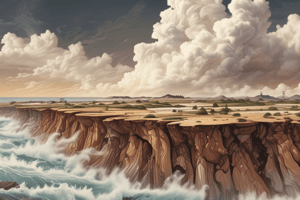Podcast
Questions and Answers
Liquefaction is a phenomenon that only occurs naturally due to earthquakes.
Liquefaction is a phenomenon that only occurs naturally due to earthquakes.
False (B)
During large earthquakes, vibrations cause solid rocks within the ground to move around quickly, leading to liquefaction.
During large earthquakes, vibrations cause solid rocks within the ground to move around quickly, leading to liquefaction.
False (B)
Pressure waves created during liquefaction travel through the ground slower than the speed of sound.
Pressure waves created during liquefaction travel through the ground slower than the speed of sound.
False (B)
The Great Hanshin Earthquake of 1995 in Japan caused groundwater to move downwards due to seismic waves.
The Great Hanshin Earthquake of 1995 in Japan caused groundwater to move downwards due to seismic waves.
Liquefaction has never occurred in the Mississippi river valley floor due to earthquakes.
Liquefaction has never occurred in the Mississippi river valley floor due to earthquakes.
Volcanic eruptions cannot trigger liquefaction because they release minimal energy into the surrounding environment.
Volcanic eruptions cannot trigger liquefaction because they release minimal energy into the surrounding environment.
Volcanic events often involve lighter material flows rather than heavier material flows.
Volcanic events often involve lighter material flows rather than heavier material flows.
Human activities like deep excavations and tunneling can disturb underground strata significantly, leading to increased permeability in affected zones.
Human activities like deep excavations and tunneling can disturb underground strata significantly, leading to increased permeability in affected zones.
Urbanization plays a minor role in exacerbating liquefaction risks.
Urbanization plays a minor role in exacerbating liquefaction risks.
Cities expanding onto previously undisturbed lands may encounter thicker and deeper levels of engineering fill beneath them.
Cities expanding onto previously undisturbed lands may encounter thicker and deeper levels of engineering fill beneath them.
Liquefaction processes are not influenced by mankind's alteration of landscapes over centuries.
Liquefaction processes are not influenced by mankind's alteration of landscapes over centuries.
Natural disasters caused by seismic activity often leave behind soft layers prone to collapse.
Natural disasters caused by seismic activity often leave behind soft layers prone to collapse.
Flashcards are hidden until you start studying
Study Notes
Liquefaction
Liquefaction is a phenomenon where soil behaves like liquid under certain conditions. It can occur naturally due to earthquakes, volcanic eruptions, or human activities such as heavy construction work. Here we will explore some of the main causes of this unusual behavior in earth's materials.
Earthquake-Induced Liquefaction
During large earthquakes, vibrations cause watery bits of sand and silt called pore fluid within the ground to move around quickly. This movement creates pressure waves that travel through the ground faster than the speed of sound. When these waves hit the surface, they cause shaking which can lead to liquefaction. The shaking dislodges particles from their place, making them more likely to flow freely with the help of any available water present in the area, creating a muddy mess similar to what you might see after a flood.
In Japan for example, during the Great Hanshin Earthquake of 1995, groundwater was pushed upwards by seismic waves, causing saturated soils to lose strength rapidly leading to extensive damage. Another famous instance occurred near New Madrid Missouri back in 1811 when an estimated magnitude 7.5 quake caused parts of Mississippi river valley floor to sink several inches due to liquefaction.
Volcano-Related Causes
Volcanic eruptions can also trigger liquefaction since they release vast amounts of energy into the surrounding environment. In areas close enough to feel tremors, there may be sufficient jolts and heat generated that could make loose sediments behave similarly to liquids. However, unlike natural disasters caused by seismic activity, volcanic events often involve heavier material flows (pyroclastic density currents) which tend to wash away anything remaining above sea level rather than leave behind soft layers prone to collapse.
Human Activities & Urbanization
Construction works involving deep excavations or tunneling operations disturb underground strata significantly. These activities increase permeability in affected zones thus promoting groundwater migration towards disturbed sites thereby facilitating liquefaction processes. Moreover, mankind has been altering landscapes drastically over centuries - urbanization being one such major change. As cities expand ever outwardly onto previously undisturbed lands, new settlements encounter increasingly thicker and deeper levels of engineering fill beneath them resulting in weakened structural integrity which eventually leads to liquifying scenarios.
The key takeaway here is understanding how various factors come together especially stresses exerted upon the planet including geotechnical issues related directly and indirectly influenced by humans themselves!
Studying That Suits You
Use AI to generate personalized quizzes and flashcards to suit your learning preferences.




